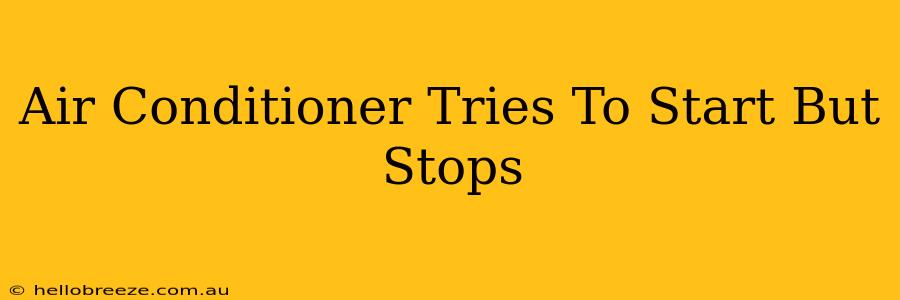Is your air conditioner refusing to cooperate? Does it try to start, but then immediately shuts down? This frustrating problem can stem from several different sources, but with a little troubleshooting, you can often pinpoint the cause and get your AC running cool again. This guide will walk you through the most common reasons why your air conditioner tries to start but stops, helping you avoid costly repair bills if possible.
Identifying the Problem: More Than Just a Click
Before diving into solutions, it's crucial to accurately describe what's happening. Does your AC make a clicking sound and then stop? Does the fan run for a moment before shutting off? Or is there simply no response at all when you try to turn it on? The specifics will help you narrow down the possibilities.
Common Culprits:
-
Electrical Issues: This is often the root cause. Problems with your electrical system can prevent your AC unit from starting properly or cause it to shut down immediately for safety reasons.
- Tripped Breaker or Blown Fuse: Check your home's electrical panel for a tripped breaker (it will be in the "off" position) or a blown fuse (it will be visibly broken). Reset the breaker or replace the fuse, and try your AC again.
- Low Voltage: Insufficient power can prevent your AC from starting. A qualified electrician can measure the voltage to determine if this is the problem.
- Faulty Wiring: Damaged or loose wiring can disrupt the electrical flow to your AC unit. This requires professional attention.
-
Compressor Problems: The compressor is the heart of your AC, responsible for circulating refrigerant. If it's malfunctioning, your unit won't start or will quickly shut down.
- Compressor Overload: This occurs when the compressor motor overheats. The unit will shut down to prevent damage. Allow the unit ample time to cool down before attempting to restart it. Repeated overloads indicate a more serious issue.
- Compressor Failure: This is a more serious problem, often requiring a costly repair or replacement. If the compressor is failing, you'll likely hear unusual noises, such as grinding or clicking.
-
Capacitor Issues: The capacitor stores electrical energy needed for the compressor to start. A faulty capacitor will prevent the compressor from engaging. This is a relatively inexpensive part to replace, but it's often best left to a qualified technician.
-
Refrigerant Leaks: Low refrigerant levels can prevent the AC from functioning correctly, causing it to stop. You’ll need a professional to identify and fix any leaks and recharge the system.
-
Frozen Evaporator Coil: Ice buildup on the evaporator coil can restrict airflow and cause the unit to shut down. Check for ice formation. Defrosting might require professional assistance.
-
Dirty Air Filter: A clogged air filter restricts airflow, causing the unit to overheat and shut down. Changing the air filter is a simple preventative measure.
When to Call a Professional
While some simple fixes like checking the breaker or replacing the air filter are easy DIY tasks, many of the problems listed above require the expertise of a qualified HVAC technician. Don't attempt complex repairs yourself, especially those involving electrical work or refrigerant handling. Improper repairs can lead to further damage and safety hazards.
Signs you need professional help:
- Unusual Noises: Grinding, clicking, or humming sounds from the unit suggest a more significant issue.
- Repeated Shutdowns: If your AC continues to shut down after attempting simple troubleshooting steps, professional assistance is required.
- Electrical Problems: Don't attempt to diagnose or repair complex electrical issues yourself.
- Refrigerant Leaks: Handling refrigerant requires specialized knowledge and equipment.
Regular maintenance is crucial to keep your AC running smoothly and prevent unexpected breakdowns. Schedule annual inspections to identify potential problems before they become major repairs. By understanding the potential causes of your air conditioner's start-stop issue, you can take the right steps to get it running again efficiently and safely.

